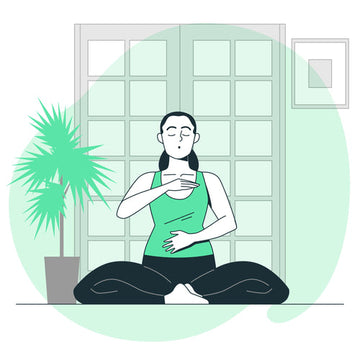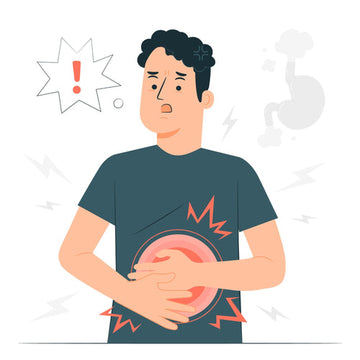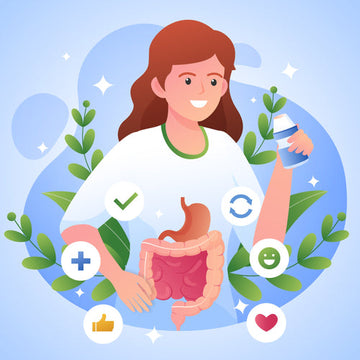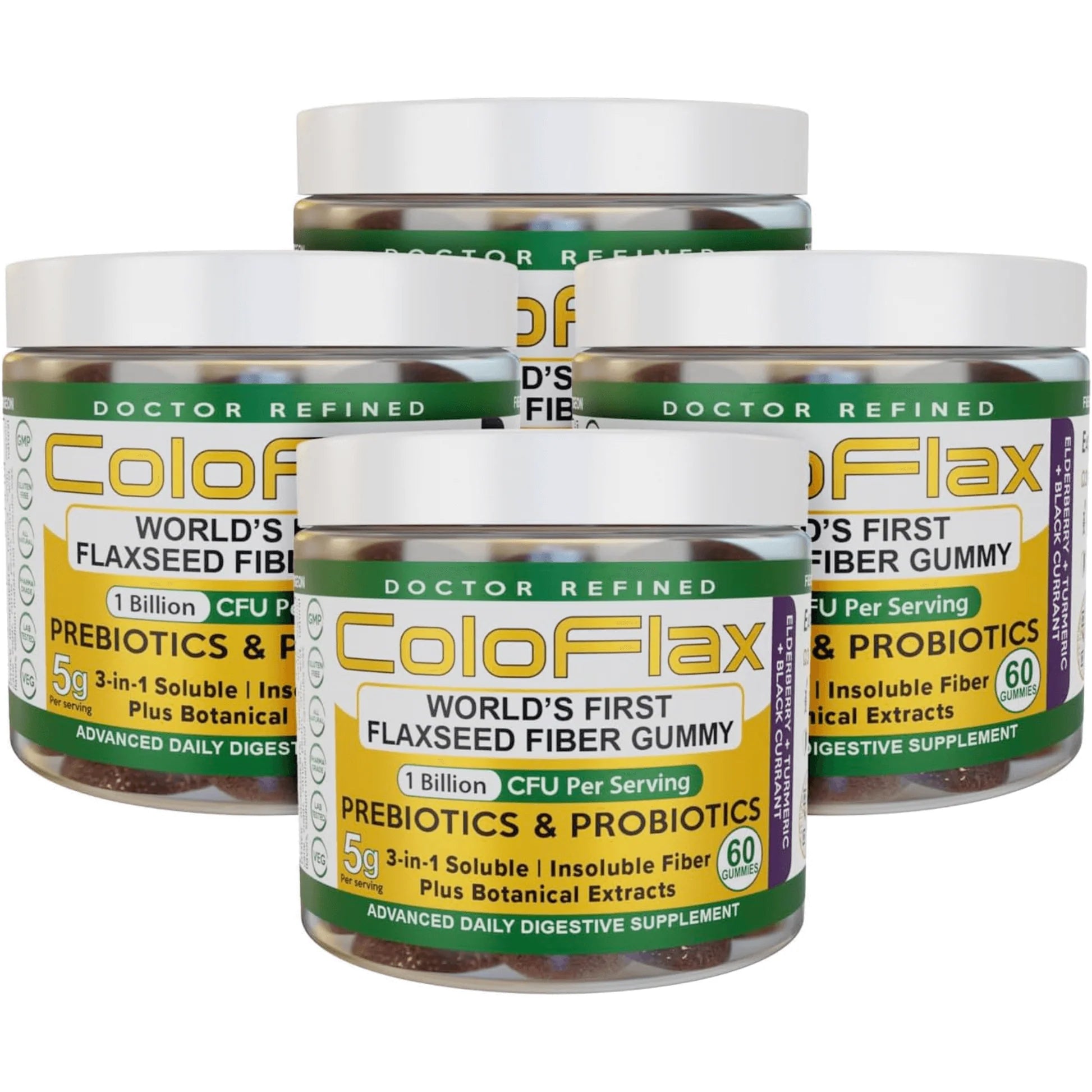Digestive disorders are fairly common, with an estimated 60 to 70 million sufferers in the United States. It’s a broad category that covers a wide variety of symptoms and prognoses, and in this guide, we’ll take a closer look at the most common ones.(1)
If you suffer from symptoms such as excessive flatulence, chronic constipation/diarrhea, and other digestive issues, you could be suffering from one of the following conditions.
Gastroesophageal Reflux Disease (GERD)
GERD is also known as acid reflux. It occurs when stomach acid backs into the esophagus, creating a burning sensation. It’s uncomfortable, and if it’s not treated, it can lead to a host of problems.
Some of the most common issues with GERD include nausea and a burning sensation in the middle of the chest. It can also cause bad breath, throat pain, hoarseness, and tooth erosion, all of which occur when the stomach acid escapes the esophagus and enters the throat.
Everyone experiences heartburn from time to time, and it’s usually nothing to worry about. But if your heartburn is chronic and severe, and it doesn’t always go away when you take an antacid or acid reflux medication, you could have GERD.
Fortunately, there are some simple solutions, including an array of medications and some lifestyle and diet adjustments. For instance, GERD symptoms tend to be worse if you spend a lot of time lying down or slouching. They can also be triggered by butter, cream, pastry, spicy foods, alcohol, and smoking.
Irritable Bowel Syndrome
Irritable bowel syndrome (IBS) affects between 5 and 10% of the population and produces a range of symptoms. These symptoms range from a minor inconvenience to severe debilitation that affects the person socially, emotionally, and even economically.
Some of the symptoms of IBS include dry stools, watery stools, or a mixture of both. Excessive gas that leads to bloating and flatulence is another common symptom, though they vary from person to person.
The exact cause of IBS is not fully understood, but the treatment usually revolves around dietary changes. For many sufferers, the first step is to avoid all foods that contain fermentable oligosaccharides, disaccharides, monosaccharides, and polyols, also known as FODMAP foods.(2)
Intestinal Obstruction
As the name suggests, intestinal obstruction is when the bowel is obstructed and food is unable to pass through. It can occur in the small or large intestine and is usually caused by fibrous tissue that forms after surgery, as well as hernias and impacted feces.
If not treated, intestinal obstruction can lead to tissue death. Blood is unable to get to the intestine and so the tissue dies. Infections can occur, as well.
There is also something known as intestinal pseudo-obstruction, which is where the body displays signs of intestinal obstruction without any actual obstruction. It occurs when digestion slows down and food doesn’t pass through as it should.
Peptic Ulcer Disease
A peptic ulcer is a type of sore that appears on the lining of the stomach, esophagus, or small intestine. It’s often caused by a bacteria known as Helicobacter pylori (H. pylori), in which case it can be treated with a course of antibiotics.
It’s a quick, easy, and effective solution, but it’s one that will require some monitoring to ensure that the treatment is working.
Other types of ulcers can be treated by letting the area heal. Proton pump inhibitors (PPIs) are often prescribed for this purpose, as they limit the production of stomach acid and have very few side effects. Antiacids are also used.
Microscopic Colitis
Microscopic colitis is an inflammatory bowel disease whereby the immune system causes inflammation of the colon lining. It is more common in women and older adults and risk factors include smoking and certain medications.
As with numerous other digestive disorders discussed in this guide, the exact cause of microscopic colitis isn’t fully understood, but your doctor can help you to find a suitable treatment.
Treatments include smoking cessation and medication changes, as well as the introduction of new medications.
Crohn's Disease
Crohn’s disease is a type of inflammatory bowel disease. It primarily affects the large intestine but can affect any part of the gastrointestinal tract and produces symptoms such as diarrhea, abdominal pain, weight loss, fever, and rectal bleeding. It is usually treated with pain medications and immunosuppressants, but surgery may also be required.
Lactose Intolerance
If you suffer from digestive distress (pain, gas, bloating, diarrhea) every time you consume dairy, you might have an intolerance to lactose.
Lactose is a sugar found in dairy and if you have lactose intolerance, it means that your body can’t digest it properly.
Fortunately, there is a very simple solution—stop eating lactose.
These days, there are a wide variety of alternatives on the market, including everything from lactose-free milk to milk alternatives (soy milk, almond milk, oat milk) and cheese alternatives.
You can also purchase OTC products that contain lactase, a type of enzyme that breaks down lactose and makes it easier to digest.
Hiatal Hernia
A hiatal hernia is when the upper part of the stomach bulges through the muscle that separates the abdomen and chest, known as the diaphragm. There is a small opening in the diaphragm known called the hiatus, and it’s through this hole that the stomach emerges.
If the hiatal hernia is small, it likely won’t cause any issues and may not be noticed until your doctor examines you for a different condition. A large hernia can cause acid to leak back into the esophagus, causing chronic acid reflux.
If the hernia is very large, surgery might be required to fix it. If not, it can be remedied with dietary changes and medications designed to reduce stomach acid.
Although it’s rare for hiatal hernias to cause complications, you should still seek advice from a doctor if you suspect that you might be suffering from this condition.
Gastroenteritis
Gastroenteritis is caused by a bacterial infection. It produces symptoms such as diarrhea, nausea, and vomiting and while it’s more common in young children, it can present in people of all ages.
Also known as “stomach flu”, the symptoms usually appear within 3 days of contact with the bacteria, and the most common offenders are salmonella and E. coli.
If you have any of the following symptoms, you may be suffering from gastroenteritis and should contact a healthcare provider immediately:
- Blood in your stool
- A fever above 104F
- Severe stomach pain
- Severe dehydration
- You can’t keep liquids or food down
Celiac Disease
Celiac disease is a severe gluten intolerance and it is thought to affect around 1% of the population, many of which don’t know they have it.
When someone with celiac disease eats gluten (found in wheat, barley, and rye) their immune system starts attacking their small intestines, creating symptoms such as abdominal pain, diarrhea, constipation, bloating, weight loss, and vomiting, to name just a few.
Prolonged exposure can cause bone loss and fatigue, and some people also suffer from anemia and seizures.
For every person who has celiac disease, there are many others who think they have it or assume they have some kind of minor gluten intolerance. But feeling bloated after you eat a 1,000-calorie sandwich or a large pizza doesn’t mean you have a gluten intolerance—it means you’re human.
If you suspect that you might be intolerant to gluten, book an appointment with your doctor and they can perform some checks. They will confirm or deny your suspicions and make suggestions regarding necessary dietary adjustments.
Diverticulitis
Diverticula is the name given to small pouches that form in the digestive tract. If these don’t present with symptoms, as is often the case, it’s known as diverticulosis.
According to the American Gastroenterological Association, diverticulosis affects around 50% of all people over 50 and it’s nothing to worry about.(3)
However, if those pouches become inflamed, it’s more of an issue, and this is what’s known as diverticulitis.
Diverticulitis causes symptoms such as abdominal pain, nausea, chills, and fever. It is more common in obese individuals and those eating a low-fiber diet, and it’s often treated with a clear liquid diet that gives the colon time to heal.
Chronic Diarrhea
Chronic diarrhea is a symptom as opposed to a disease. It can be caused by many of the disorders listed in this guide, as well as poor dietary choices and alcohol use.
Some recreational drugs and prescription medications can also cause diarrhea.
In such cases, however, there’s a good chance you’ll know what the cause was. If you started taking a new medication two weeks ago and have had diarrhea ever since, or it happens every time you eat spinach, you’ll have a good idea of what the issue is.
If not, your first port of call should be to consult your physician. They can run some tests to rule out the worst-case scenarios and check if there are any underlying issues. If nothing can be found, they’ll suggest some dietary changes or give you medications to control the issue.
Chronic Constipation
Constipation, like diarrhea, is a symptom of many digestive disorders. It’s also something that can be triggered by certain medications (including opioid pain medications) and dietary choices (low fiber, not enough water).
One of the biggest misunderstandings about constipation is that it only applies if you don’t have a bowel movement for several days. In actual fact, it applies whenever you have a drastic change in your bowel habits and have far fewer bowel movements than you usually do.
For some, “normal” is 2 or 3 times a day. For others, it’s 3 or 4 times a week. It varies based on everything from your digestive system to your diet. It’s all about what’s normal for you and whether there have been any changes in your routine.
To learn more, take a look at our article on constipation causes and solutions.
What to Do If You Have a Digestive Disorder
There are many ways to alleviate the symptoms of digestive distress. You can take a fiber supplement to increase your intake of soluble and insoluble fiber, change your diet, exercise more, and eat fermented foods.
But if those issues are causing you great distress and have been ongoing for some time, your first approach should be to consult with a physician.
Describe your symptoms, get a diagnosis, and listen to their advice. It could be that you just need to make some minor diet or lifestyle changes. It could be that you need a laxative or digestive enzyme. Either way, you need to know that there is nothing serious happening before you go any further.






